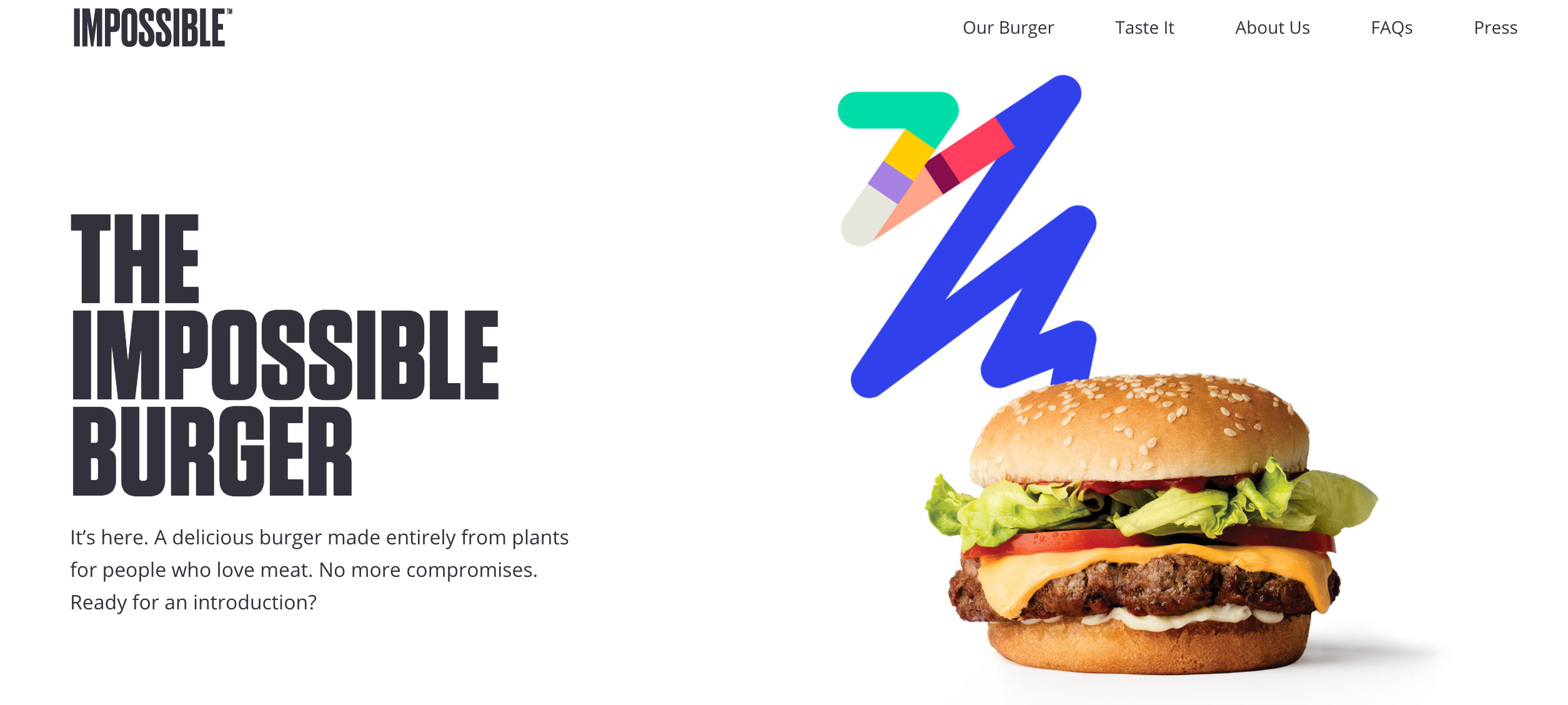
The revolution may not be televised but it will be Snapchatted, Instagrammed, Tweeted, Liked, and Shared. The Millennial obsession with food has given rise to an increased awareness of the sources of nutrition, and the importance of using our purchasing power to support sustainability. Globally, we realize that the current food system is finite, and that to ensure a healthy future we must fundamentally change our food sources as well as our relationship to what we eat. In order to affect the type of change that would alter the food system to make it more sustainable, we must think seriously about moving away from eating conventional meat toward relying on plant based sources of protein.
It is a considerable challenge, even in the face of overwhelming evidence of its necessity. For better or worse, we are led by our stomachs, and they sometimes betray our convictions. Call it the curse of our human condition: as Oscar Wilde once said, “when I am in trouble, eating is the only thing that consoles me”. Ultimately, food has to provide us with those symbolic comforts, and to many people a juicy hamburger or a thick steak is the only thing that can cure what ails them. Fortunately, some of the brightest minds in food and science understand that convincing people to embrace plant proteins means persuading their taste buds as well as their brains. More than ever before, startups and innovators are developing a range of plant based products that are not only better sources of protein, but also taste delicious. We spoke with plant protein startups from around the world to get their thoughts on the future of food, the potential for new sources of protein, and their own work in the field.
Israeli startup InnovoPro came together when its founder, Dr. Ascher Shmulewitz, developed a protocol to extract protein from chickpeas, an ancient legume that have been consumed for thousands of years all over the world. CEO Taly Nechushtan explained that InnovoPro took Dr. Shmulewitz’s passion for food as a preventive cure for diseases and brought it into production, developing “a patent-pending technology for extracting protein concentrate from chickpeas which is non-GMO, non allergenic, vegan, sustainable, healthy, and delicious.”
 Nechushtan believes that InnovoPro stands out in a saturated market through its functionality, taste, color, safety, and ancient heritage. As she notes, “Our product enables formulating clean-label products, since it has strong emulsifying, water and oil binding properties that make it a superb binding agent.” The off white color and neutral taste allow InnovoPro to be used in numerous applications, such as dairy replacement beverages, non-dairy desserts, plant-based spreads and vegan mayonnaise. Safety plays an important role in any food of the future, and with the rise of food allergies, companies need to consider their product’s safety to a wide range of consumers. For Nechushtan, this is an inherent virtue of InnovoPro: “While many other animal-based proteins (whey, egg) are known allergens, chickpea protein is not on the allergen list. Additionally, chickpea protein is more sustainable than meat and dairy products.”
Nechushtan believes that InnovoPro stands out in a saturated market through its functionality, taste, color, safety, and ancient heritage. As she notes, “Our product enables formulating clean-label products, since it has strong emulsifying, water and oil binding properties that make it a superb binding agent.” The off white color and neutral taste allow InnovoPro to be used in numerous applications, such as dairy replacement beverages, non-dairy desserts, plant-based spreads and vegan mayonnaise. Safety plays an important role in any food of the future, and with the rise of food allergies, companies need to consider their product’s safety to a wide range of consumers. For Nechushtan, this is an inherent virtue of InnovoPro: “While many other animal-based proteins (whey, egg) are known allergens, chickpea protein is not on the allergen list. Additionally, chickpea protein is more sustainable than meat and dairy products.”
Indeed, while chickpea protein is not a complete protein, it becomes so when combined with other plant proteins, offering tremendous potential for its use with other products. On its own, chickpea protein has a wealth of benefits, as Nechushtan points out. “It’s protein quality is generally considered to be better than other pulses, it contains significant amounts of essential amino acids, it is rich in unsaturated fatty acids, chickpea oil contains sterols, and it is a great source of vitamins and minerals.” As food preparation becomes more sophisticated and the need for diverse ingredients grows, the versatility of chickpea protein makes it an essential element of tomorrow’s menu.
Taking a sabbatical from his medical research at Stanford University to figure out how he could have the biggest impact on the world, Dr. Patrick Brown realized that our reliance on animals for food production has a profound effect on our environmental impact, and that it would only grow as the global population increased. Nick Halla, Chief Strategy Officer at Impossible Foods, explained Dr. Brown’s path towards founding Impossible Foods in 2011: “as a biochemist, he realized it’s completely solvable to make better products more sustainably. [Dr. Brown] founded Impossible Foods to transform the global food system by inventing better ways to make the meat, fish, and dairy products we love, all directly from plants, without any compromise.”
 That dedication meant that Impossible Foods would not only create sustainable foods to replace animal products, but would make sure that no one missed the real thing anyway. As Halla explains, “the Impossible Burger was created first and foremost to be absolutely delicious, and this is the first thing that stands out. We have to meet and exceed the bar animal foods have set for delicious foods.” Understanding that people would have to love the taste if they were going to make the switch, Impossible Burger underwent blind tastings until their product was mistaken for a beef burger in its testing. “Meat loving customers are raving about the Impossible Burger,” Halla declares, “it is versatile and can be used in many applications ranging from burgers to tacos to bolognese sauce.” On top of this, the team has created prototypes of other types of meat, dairy and fish, which they plan to introduce to the market in the coming years.
That dedication meant that Impossible Foods would not only create sustainable foods to replace animal products, but would make sure that no one missed the real thing anyway. As Halla explains, “the Impossible Burger was created first and foremost to be absolutely delicious, and this is the first thing that stands out. We have to meet and exceed the bar animal foods have set for delicious foods.” Understanding that people would have to love the taste if they were going to make the switch, Impossible Burger underwent blind tastings until their product was mistaken for a beef burger in its testing. “Meat loving customers are raving about the Impossible Burger,” Halla declares, “it is versatile and can be used in many applications ranging from burgers to tacos to bolognese sauce.” On top of this, the team has created prototypes of other types of meat, dairy and fish, which they plan to introduce to the market in the coming years.
The beauty of products like the Impossible Burger is that while customers are happily chowing down and taking their first Impossible selfie, they are contributing to a more sustainable food system. The Impossible Burger “produces 87% less greenhouse gas emissions, uses 95% less land, and uses 74% less water than meat from a cow,” according to Halla and his team. The Impossible Burger already features on restaurant menus across the United States, and their ability to convert carnivores means that these numbers might soon start to have a real impact on the food system. Hey, anything’s possible.
With any great idea there is always a quest for someone to back it and invest, and in a sector as saturated as the food industry, finding capital for a startup can be a monumental (and often futile) effort. New Crop Capital is looking to change this, as partner Christopher Kerr explains. “New Crop Capital (NCC) is a specialized private venture capital fund that invests in talented, focused entrepreneurs and early stage companies whose products and services have the potential to replace foods derived from conventional animal agriculture.” By looking to fundamentally alter the structure of production models, New Crop taking a new approach at an old adage: ‘follow the money.’
NCC has a clear mission in front of them, and they know precisely what their target is in the quest for a better food system. “We see our food system as one that is highly flawed and, in many cases, no longer serving the best interests of consumers. Much of what we consume is creating collateral damage in other aspects of society.” NCC provides Acceleration, Seed, and Series A funding ranging from $50,000 to $1,000,000 and specifically invests in “plant-based replacements for meat, dairy, eggs, and seafood (and the distribution thereof), as well as clean meat,” according to Kerr. Their investment in Good Catch plant-based tuna is a good example of their ethics, and their business smarts: the product, which has all of the nutrients and taste of tuna without the mercury, won the “Expo East 2017 Editor’s Choice Award” at the National Products Expo East.
NCC is using innovation in the marketplace to solve systemic problems, as Kerr explains. “We believe that we can redesign food production to meet the needs of consumers in taste, price, and convenience. By streamlining food production with plant-based offerings and clean meat options, we can meet these needs and repurpose this excess farming and production capacity to serve humanity and our planet.” Using their influence in the market to not only respond to customer demands (like taste) but to also foster participation in a concept (like sustainability), NCC is helping to disrupt the current food system at its very core.
The success of these companies and others in the plant protein market gives them a particularly keen vantage point to identify the direction that food is taking. Moreover, companies who actively engage with consumers to change their outlook on eating have keen insights into what people want, and what they have come to expect. Moreover, understanding the power of young people in the market and involving them in the process of redesigning the food system is a crucial element of genuine sustainability, and one of which Kerr is acutely aware. “Consumers are looking for transparency in their food system. They are looking for tasty, convenient food. They do not want to give anything up, but they also want to participate in sustainability and environmental awareness. Social media has created this transparency, and new consumers (namely Millennials) are driving a new buying pattern– and it is skewing toward plant-based, convenient eating.”
Highlighting the difference between the vegetarian replacements of yore and new generation of plant based proteins also helps to show consumers that the latter are a viable substitute for animal derived products. This is not your grandma’s Tofurkey, and that’s a good thing. Halla notes that “in the past, plant based foods have not come close to meeting the sensory demands of mainstream consumers…this is changing…a couple of decades ago plant based milk sales were small, and now [they] are 10% of the market in the United States.” The success of startups in recreating the mouthfeel and texture of a ‘real’ burger allow them to respond to trends and set the standard for plant based foods. Another plant based protein, the Beyond Burger, is distributed not only by Whole Foods but by more mainstream supermarkets like Kroger in over 500 locations around the United States.
Moreover, the Beyond Burger will soon feature on the menu at TGI Fridays, a national chain of fast casual restaurants serving people who may not engage otherwise with plant based proteins. The success of Beyond to transcend the health food market niche is such that Bill Gates, Tyson Foods, and even Leonardo diCaprio have all signed on as investors. But the plant protein plunge is not limited to fast casual restaurants: prolific chef David Chang recently partnered with Patrick Brown of Impossible Foods to open Nishi, a New York restaurant that serves the Impossible Burger as the signature dish on its menu. As influencers like Chang embrace plant based proteins, their legitimacy as viable alternatives to animal proteins grows, along with their sales.
Indeed, the need to meet growing demands by quickly developing scale-up capabilities is at the top of the to-do list. Impossible Burger’s Halla noted that “the biggest challenges have been scaling quickly to meet the accelerating work-wide demand and need for our products.” InnovoPro’s Nechushtan echoed that sentiment, but added that ensuring that partnerships are the right fit for both the product and the market are essential to the growth and sustainability of the plant protein market. This is part of what makes groups like New Crop Capital so important, as they are looking beyond the next food fad and towards companies whose products will be part of a fundamental change in the global food system. “We will not invest in the next energy bar or fad CPG product,” NCC’s Kerr explains, “our focus is to grease the wheels of change by working with the most innovative companies whose success will truly change the communities they serve.” The introduction of plant based proteins is more than a trend in our eating culture, and the aim of those involved is not just to go viral online and make a name for themselves. Instead, they are the architects of a paradigm shift, as the way that food is produced and consumed as well as our most basic notions of what food can be, undergo a profound transformation.

Source : https://seedsandchips.com/newsandpress/Mission%20possible%3F%20How%20plant%20proteins%20are%20changing%20the%20food%20system%20?id=5a38c6aa01bc9e6bf4a84ff8
